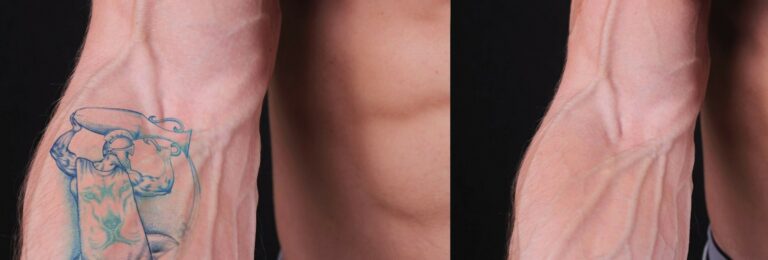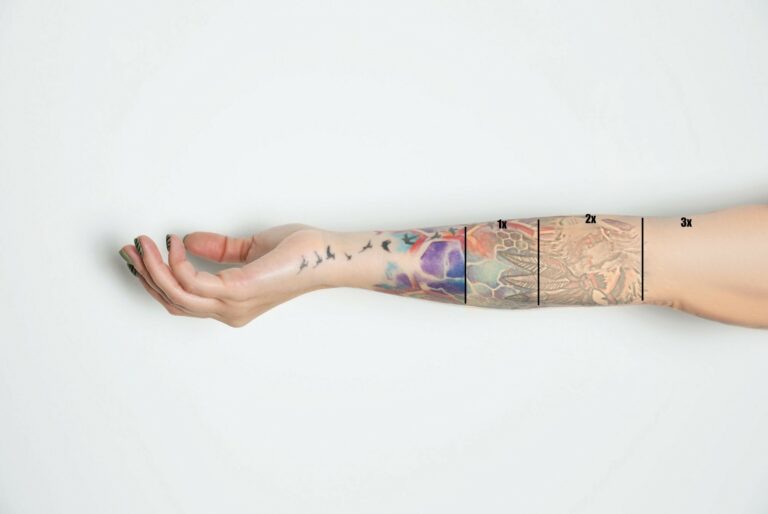Preparing for Tattoo Removal – Pre-Treatment Guidelines
Brief Overview of the Tattoo Removal Process
Tattoo removal is a procedure used to eliminate unwanted ink from the skin. The process involves the use of lasers that target the pigment in the tattoo. This light energy is absorbed by the ink, which then breaks down into smaller particles that can be eliminated by the body’s immune system.
The number of treatments required to remove a tattoo varies based on several factors, including the size and location of the tattoo, as well as its color and age. Black tattoos are typically easier to remove than colored ones since they absorb more light energy from the laser.
Tattoo removal can be uncomfortable, but most people report that it is less painful than getting a tattoo. It is important to note that the complete removal of a tattoo may not always be possible, and scarring or changes in skin texture may occur.

Following Pre-Treatment Guidelines is key to success
Following pre-treatment guidelines is crucial to achieving optimal results during tattoo removal. These guidelines are designed to prepare your skin for treatment and reduce any potential risks or complications. By following these guidelines, you can also ensure that your body is in good health before starting treatment.
This will help improve your immune system’s ability to eliminate ink particles from your body efficiently. Neglecting pre-treatment guidelines can result in adverse effects such as prolonged healing times or increased risk of infection after each session.
It’s important not only to follow these guidelines before starting treatment but also throughout your entire course of treatment for the best results and minimal side effects. In the following sections, we will discuss what steps you should take when preparing for your appointment including consultation with professionals who will analyze what options are available and recommend tailored pre-treatment plan specific to you.
Consultation with a Professional
Tattoo removal is a complex process and should only be performed by a qualified professional. Before starting the tattoo removal process, it is essential to consult with a professional to receive the necessary information and guidance. The consultation will also help determine if you are a good candidate for tattoo removal.
During the consultation, discuss your expectations regarding the tattoo removal process and ask any questions you may have. Make sure to ask about the procedure’s estimated number of sessions, cost, potential side effects, and any other concerns you may have.
The professional should be able to provide answers while helping you understand what to expect before, during, and after the treatment. Additionally, make sure that you choose an experienced professional who uses FDA-approved technology for tattoo removal.
Ask about their qualifications and experience in performing tattoo removal procedures. Inquire about their previous cases and ask if they have treated tattoos similar in size or color as your own.
Before concluding your consultation appointment, make sure that you understand all aspects of the procedure. Be honest with your provider regarding your medical history or medications taken so that they can take them into consideration when designing an individualized treatment plan.
The importance of consulting with a professional before starting the tattoo removal process
Before beginning any medical treatment like laser tattoo removal it is essential to consult with a qualified expert who can provide guidance specific to your individual needs. Not everyone is suitable for laser tattoo removal—it depends on factors such as age, skin tone/type/color as well as the location of tattoos on one’s body. Therefore it’s vital to visit an experienced medical provider who specializes in laser treatments for tattoos—that includes plastic surgeons and trained dermatologists—before undergoing this type of treatment.
One benefit of consulting with a professional before starting the tattoo removal process is identifying whether you’re suited for it or not. Consulting helps determine how many sessions would be required based on the size, age, and color of your tattoo.
Furthermore, consulting with a professional will give you an idea of what to expect regarding the removal process. It will help determine whether you would be comfortable with the treatment’s cost and any potential side effects that may occur after undergoing the process.
Be curious: Questions to ask during the consultation
When consulting with a professional, it’s essential to come prepared with questions about tattoo removal. This is an opportunity for you to learn all about what is involved in this complex process and how it may affect your life.
Here are some vital questions to ask:
- What type of laser technology do you use?
- How many sessions will be required for complete removal? What are the potential side effects?
- Is there any pain associated with the procedure? If so, how can I manage it?
- Are there any pre-treatment guidelines that I need to follow before each session? What outcomes can I expect from this process?
Asking these critical questions during your consultation appointment will help inform your decision-making. Additionally, make sure that you understand all aspects of the procedure before concluding your consultation appointment.
Medical History and Skin Evaluation
Before starting tattoo removal treatment, it’s important to disclose your full medical history to the professional. Certain medical conditions or medications you’re taking can affect the outcome of the treatment and even your ability to undergo the procedure in the first place.
For example, if you have a history of keloid scarring, your skin may not heal well after tattoo removal. In addition to medical history, the professional will also conduct a skin evaluation and analysis.
This allows them to assess the condition of your skin and determine factors that may impact tattoo removal. Skin type is a key factor in determining how many treatments may be needed for effective removal.
Lighter skin types generally require fewer treatments than darker skin types because they absorb less light during laser treatment. The professional will also look for any signs of infection or other skin conditions that could affect healing after treatment.
Importance of Disclosing Medical History to the Professional
Disclosing your full medical history is crucial for safe and effective tattoo removal treatment. Medical conditions or medications that thin blood can lead to excessive bleeding during treatment, while certain medications such as Accutane can make skin more sensitive and prone to scarring.
Additionally, some underlying health conditions such as diabetes can slow down the healing process and increase the risk of infection. The professional will ask you about any current medications you’re taking, including over-the-counter drugs such as aspirin that may thin the blood.
They will also ask about previous surgeries or illnesses that could impact healing after treatment. By providing accurate information about your medical history, you’ll help ensure safe and effective tattoo removal.
Skin Evaluation and Analysis by the Professional
The professional will conduct a thorough evaluation of your skin prior to starting treatment with laser technology used for the tattoo removal process so they can tailor the treatment to your specific needs. This evaluation includes assessing your skin type, checking for any signs of infection or other skin conditions, and examining the tattoo in question to determine factors such as size, color, and depth. They will also look at any scarring or discoloration around the area that may affect the outcome of treatment.
After conducting a full analysis, the professional will create a customized treatment plan based on your individual needs. They’ll provide you with an estimate of how many treatments may be needed for full removal and explain what you can expect during and after each session.
Factors That Can Affect Tattoo Removal
The effectiveness of tattoo removal is influenced by several factors. Some of these include:
- The age and location of the tattoo
- The color and ink density
- Your overall health and immune system function
- Your skincare routine following each treatment session
Darker pigments are typically harder to remove than lighter colors because they absorb more laser energy during treatment. The density of ink in a tattoo can also impact effectiveness since more heavily inked tattoos require more treatments to break down all the pigments evenly.
Your overall health is another factor that can affect how well your body responds to treatment. Those with compromised immune systems or underlying health issues may experience slower healing times following each session, which can prolong overall treatment time.
Taking care of your skin properly after each session is important for optimal results. Following post-treatment guidelines such as avoiding sun exposure or picking at scabs helps promote healthy healing and reduces risk of complications like scarring or infection.
Pre-Treatment Guidelines
Avoid Sun Exposure: Protection is Key!
Sun exposure can have a significant impact on the tattoo removal process. The radiation from the sun can cause skin damage and increase the risk of scarring. It can also cause the skin to become more sensitive during treatment, leading to discomfort or pain.
To protect your skin, it is recommended that you avoid sun exposure at least two weeks prior to your treatment. If you have to be out in the sun, make sure you apply sunscreen with an SPF of 30 or higher.
Wear protective clothing that covers the tattooed area and seek shade whenever possible. Remember, prevention is always better than cure when it comes to protecting your skin.
Avoid Blood Thinners and Alcohol Consumption: Stay Sober!
Blood thinners such as aspirin, ibuprofen, and naproxen can increase bleeding during treatment which may lead to complications such as bruising or excessive swelling. It is recommended that you avoid these medications for at least two weeks before your appointment.
Alcohol consumption should also be avoided one week before the procedure as it can interfere with blood clotting ability which may lead to bleeding complications during the procedure. If you need medication for pain relief after treatment then acetaminophen (such as Tylenol) is recommended instead of over-the-counter painkillers like aspirin.
Hydrate and Eat Healthily: Fuel Your Body
It’s important to stay hydrated before tattoo removal because dehydration can affect tissue quality and cell structure in a negative way which can slow down healing time after treatment. Drinking plenty of water before and after treatment will help keep cells healthy so they are able to repair themselves quickly. Eating a well-balanced diet rich in vitamins and minerals including fruits, vegetables, lean proteins, whole grains and low-fat dairy products will help to maintain optimal health and provide the nutrients cells need to heal efficiently after treatment.
Shave Treatment Area: Trim It Down
Shaving is necessary before the tattoo removal process because hair can interfere with laser light penetration. If your hair is too long, it may absorb some of the laser energy and reduce its effectiveness. Shaving the area before treatment will ensure that laser energy is applied directly to the skin without interference.
To properly shave, use a clean razor and shaving cream or gel. Be gentle and avoid cuts or nicks which can cause infection or scarring.
Avoid Smoking: Breath Easy
Smoking can have a negative impact on wound healing after tattoo removal as it reduces blood flow to the skin which slows down tissue regeneration. It also impairs immune function which increases your risk of infection during recovery time after treatment.
If you’re a smoker, consider quitting before your appointment. Not only will this help with healing after treatment but it will also improve overall health by reducing the risk of lung cancer, heart disease, and many other illnesses associated with smoking.
To summarize
Preparing for tattoo removal is an important step in ensuring a successful treatment outcome while minimizing any potential complications during recovery time afterward.
Following these pre-treatment guidelines including avoiding sun exposure, blood thinners/alcohol consumption, staying hydrated and eating healthy foods rich in vitamins/minerals, shaving the area beforehand, and not smoking will help to optimize results while reducing risk factors associated with wound healing processes after surgery!
references
Picosecond lasers for tattoo removal: a systematic review – PubMed (nih.gov)
Medical Disclaimer:
The information provided on this website regarding tattoo removal techniques is for general informational purposes only. It is not intended to be a substitute for professional medical advice, diagnosis, or treatment. Always seek the advice of a qualified healthcare professional regarding any medical condition or concerns, including tattoo removal.
The content presented on this website should not be interpreted as endorsing or promoting any specific tattoo removal technique, product, or service. The effectiveness, safety, and suitability of tattoo removal methods can vary depending on individual circumstances and factors. Therefore, it is crucial to consult with a medical professional or qualified specialist before making any decisions or embarking on any tattoo removal procedure.
The website does not guarantee the accuracy, completeness, or reliability of the information provided. Reliance on any information from this website is solely at your own risk. The website and its owners, authors, and contributors shall not be held liable for any damages or consequences arising from the use of the information provided.
It is important to note that medical practices and standards may change over time, and the information provided on this website may not always reflect the most up-to-date research or guidelines. Therefore, it is recommended to consult with healthcare professionals or reputable sources for the latest information and advice on tattoo removal techniques.
If you experience any adverse reactions, complications, or concerns during or after a tattoo removal procedure, promptly seek medical attention. Only a qualified healthcare professional can assess your specific situation and provide appropriate advice and treatment.
By using this website, you acknowledge and agree to the above disclaimer, and you understand that the website and its owners, authors, and contributors cannot be held responsible for any decisions or actions taken based on the information provided.




